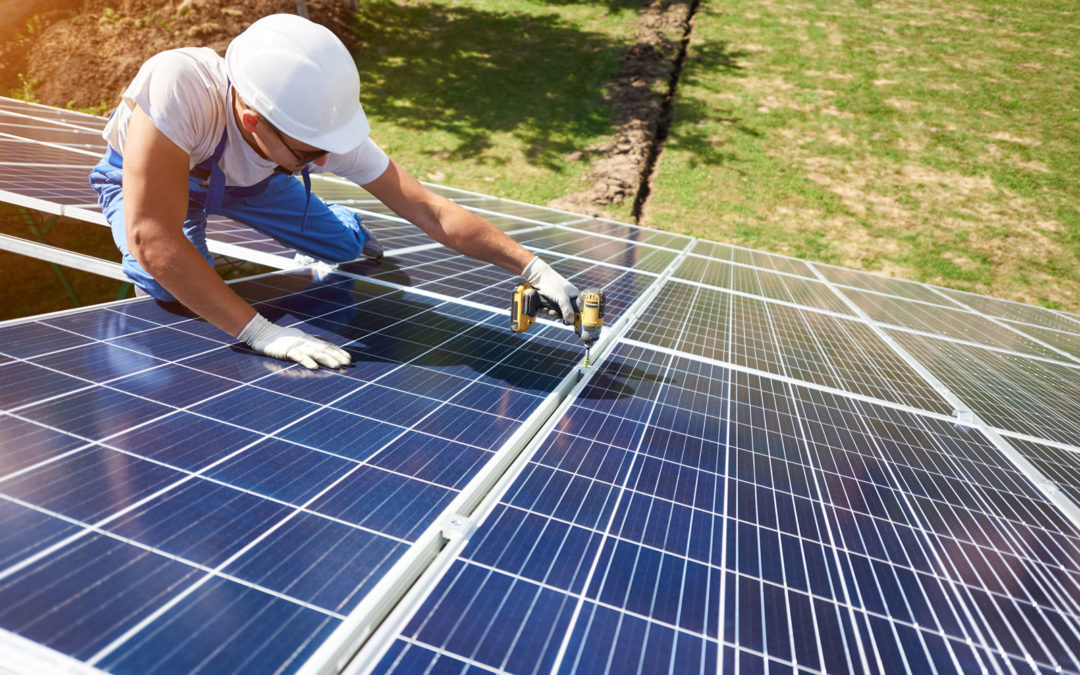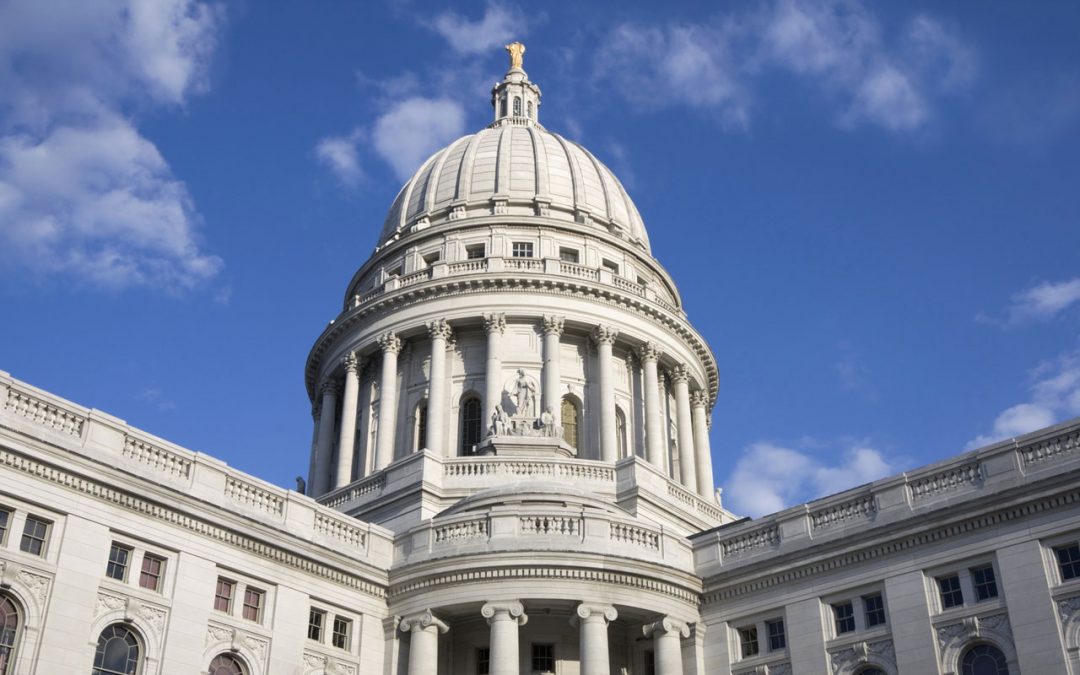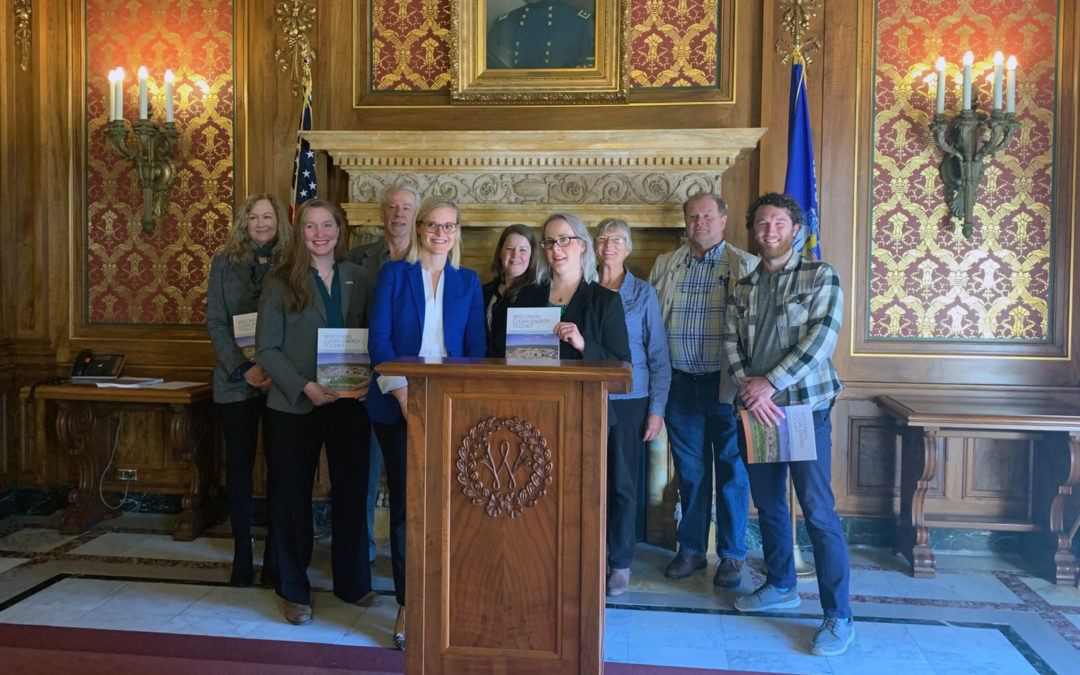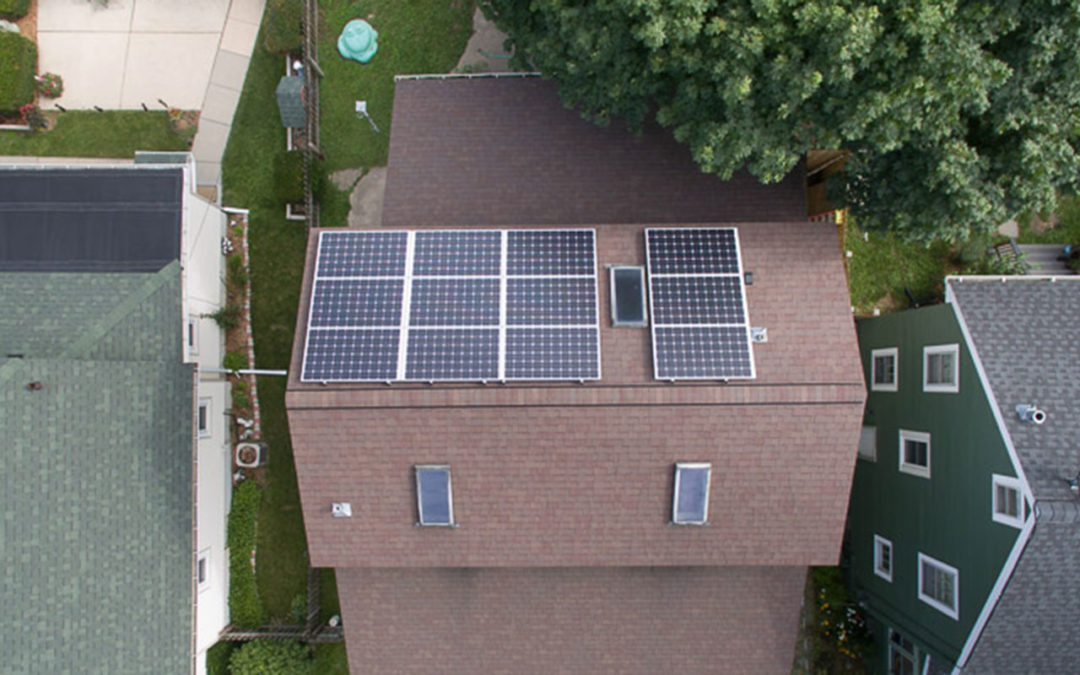
by Jim Boullion | Apr 17, 2020 | Policy, Solar
The COVID-19 crisis has resulted in many extraordinary measures to be taken by the federal, state, and local governments such as the “Safer at Home” order prohibiting groups of people from gathering and prohibiting some businesses from operating that pose a high risk of exposing their clientele to infections. These measures have resulted in a major impact on businesses in general and the solar industry in particular.
As a new affiliate of the Solar Energy Industry Association (SEIA) we will be bringing you updates that they they are able to share on the COVID 19 issue as well. There is a lot of information there, but check out these webpages first:
SEIA: Permitting Options for Solar Installations During the COVID-19 Outbreak
SEIA: Guidance for Solar Installers, EPCs and O&M Service Providers on Managing Through the COVID-19 Pandemic
In Wisconsin, the construction industry, including solar, has been determined to be an “essential business” for the life-safety and infrastructure support benefits that it provides. Since this is new for everyone, the rules and guidance for how to operate in this environment are being created and amended regularly.
The leading solar and construction industry trade associations have developed excellent resources with FAQ’s on many of the important questions that contractors have such as:
Can contractors work inside buildings as well as outside?
Yes, but all essential businesses, to the greatest extent possible, are encouraged to use personal protective equipment where appropriate, use technology to avoid meeting in person when possible and engage in social distancing.
Do I need documentation to prove that I’m an “essential worker?” (ABC of Wisconsin)
Essential workers do not need documentation to prove they are essential, according to state agency staff. Police are generally not going to be stopping individuals and asking for proof. In some rare instances, construction employees have been asked to provide documentation to prove they are essential and exempt from the “safer at home” order. While not required, it may be helpful and prudent to provide your employees with a letter explaining their exemption from the emergency order.
Do I need to request any type of exemption for my business? (ABC of Wisconsin)
The Wisconsin Economic Development Corporation (WEDC), which is the government agency charged with determining whether businesses are “essential,” has indicated that if your type of business is listed (i.e. construction) there is no need to get a designation to become exempt; you are already included under exempt. If your business type is listed as essential, there is no further action required.
Am I required to have written COVID-19 response plan? (ABC of Wisconsin)
While it is not explicitly required in the state’s order, the WEDC encourages each business to develop a written COVID-19 response plan that is unique to each individual business and type of work being done.
If someone is positive with COVID-19, do I have to record in on my OSHA log? (ABC of Wisconsin)
Most likely, no. As an employer, you should determine whether there was any exposure that occurred in the work environment that caused or contributed to the test positive. As a practical matter, it is very difficult to do this and not practical to ascertain there was exposure on the worksite. OSHA would have to prove that the employee testing positive was work-related. If you have a COVID-19 case that results in a fatality or in-patient hospitalization, you would want to call OSHA. You would also likely be engaged with your local health department if this were to occur.
What steps should I be taking as a contractor employer? (ABC of Wisconsin)
Under the “General Duty” clause from OSHA, employers are to provide a safe and healthy workplace free from hazards that could cause death or serious physical harm. Employers should follow the recommendations for the number of employees on a particular worksite and instruct employees on the practice of social distancing, or ensuring employees keep a six foot distance between one another while working. Employees should not share tools.
Employers should remind employees to take basic, preventative measures to reduce the spread of coronavirus at the workplace, including these recommendations:
• Washing hands frequently with soap and water for at least 20 seconds or use an alcohol-based sanitizer that contains at least 60% alcohol
• avoiding touching their eyes, nose and mouth;
• covering sneezes or coughs with tissues, if possible, or else with a sleeve or shoulder;
• avoiding close contact with people who are sick;
• staying home when sick; and
• cleaning and disinfecting frequently touched surfaces and objects.
Employers should provide adequate supplies in the workplace for employees to follow these recommended practices.
CDC guidelines for protecting employees
www.cdc.gov/coronavirus/2019-ncov/index.html
ABC of Wisconsin Jobs Ambassador Rebecca Kleefisch discusses how contractors are addressing job site and employee safety and not taking lightly the declaration that construction is an “essential service” in Wisconsin. https://www.youtube.com/watch?v=ebRAC98RuAk&t=53s
The following websites are currently open to the public and you don’t have to be a member of the associations to access these resources.
Associated Builders and Contractors of Wisconsin
www.abcwi.org/covid-19-updates
Wisconsin Builders Association
www.wisbuild.org/news-1/covid19
Associated General Contractors of Wisconsin
www.agcwi.org/covid-19.html
Associated General Contractors of Greater Milwaukee
agc-gm.org/uncategorized/coronavirus/
agc-gm.org/news/agc-of-gm-covid-19-documents/
agc-gm.org/wp-content/uploads/2020/03/COVID-19-Recommended-Practices.JointAGC.docx
Construction Coalition Issues Joint Statement on Jobsite Safety During COVID-19 outbreak:
“Fifteen labor and management organizations in Wisconsin committed to the health, safety and welfare of our workforce and the public by issuing specific mitigation strategies to combat the COVID-19 outbreak on jobsites.”
State of Wisconsin COVID-19 Information Webpage
govstatus.egov.com/wi-covid-19
Wisconsin Department of Safety and Professional Services
dsps.wi.gov/pages/Home.aspx
We will bring you further updates as they develop. If you have specific questions please contact Jim Boullion, RENEW Wisconsin’s Director of Government Affairs at jim@renewwisconsin.org or by cell phone at (608) 695-7004.

by Jim Boullion | Mar 24, 2020 | Policy
Questions?
Contact Jim Boullion, RENEW’s Director of Government Affairs
jim@renewwisconsin.org
Office: (608) 255-4044 – ext 4 • Cell: (608) 695-7004
______________
03.24.2020 • Governor Evers Retains Exemption for Construction from Mass Gathering Restrictions in his Safer at Home order. If a business is unsure about whether or not they are exempted from this order, please contact the Wisconsin Economic Development Corporation here.
______________
03.23.2020 • Construction exempted from mass gathering restrictions – For now…
Gov. Tony Evers’ administration has issued Emergency Order #8, which clarifies that construction operations on private and public projects are exempt from previous orders related to bans on mass gatherings in response to the COVID-19 pandemic.
Effective at 5 p.m. on March 17, all public and private mass gatherings of more than 10 people in Wisconsin were prohibited in an attempt to slow the spread of COVID-19 with certain exceptions. On Friday, March 20, an exemption was extended to “Construction sites and projects, including public works and remodeling projects,” according to the new emergency order. The order, signed by Health Services Secretary-designee Andrea Palm, remains in effect for the duration of the public health emergency declared by Gov. Evers or until a superseding order is issued.
However, keep an eye on the Governor’s actions in the next few days. In a series of tweets today (Monday) Governor Evers said to expect an expanded Emergency Oder called “Safer at Home”. You can see the Tweets here: https://twitter.com/GovEvers/status/1242097513785479169
______________
03.23.2020 • WEDC is providing up to $5 million in grants to small businesses in the state to help offset losses related to coronavirus response measures.
Gov. Tony Evers has issued a public health emergency in response to the coronavirus outbreak, banning gatherings of more than 10 people and ordering bars and restaurants to close to in-house patrons. Retailers are also expected to take a hit as consumers stay home to prevent further community spread of the virus.
To address some of the economic impact, WEDC has developed a $5 million grant program for small businesses. Individual grants are capped at $20,000 and reserved for companies with 20 employees or fewer that have borrowed from one of the state’s 23 community development financial institutions. The funds will go toward rent and payroll expenses including paid leave for workers. Companies that hope to receive grants will have to apply through participating CDFIs, and WEDC plans to announce results in the next few weeks.
CDFIs include credit unions and community development banks, as well as nonprofit loan funds and venture capital funds. Grant applications will be handled by the CDFIs rather than WEDC.
The Small Business 20/20 program was approved Tuesday by the agency’s board of directors. According to WEDC spokesman David Callender, at least 250 businesses will receive grant funding. “Based on our board’s discussions yesterday, some of the small businesses are estimating losses below $20,000, so that would mean the number of participants could be higher,” he said in an email.
WEDC Secretary and CEO Missy Hughes noted many of these “smallest of the small” companies don’t have sufficient reserves to survive prolonged revenue losses. “I know that is not satisfactory to a lot of businesses around the state; I know it’s a drop in the bucket,” she said. “Hopefully as we see it working, we can start to expand it as more resources become available.”
CDFIs with a minimum portfolio size of at least $4 million are being encouraged to participate in the grant program. But smaller ones can also apply jointly if they have a combined portfolio size of at least $4 million.
See the release:
https://wedc.org/blog/wedc-announces-targeted-grants-to-small-businesses-suffering-losses-due-to-coronavirus-emergency/
See more program info:
https://wedc.org/programs-and-resources/small-business-2020/
______________
03.23.2020 • Gov. Tony Evers is requesting loan assistance from the U.S. Small Business Association for Wisconsin companies impacted by the coronavirus fallout.
In a letter to SBA leadership, Evers noted lower consumer activity, sweeping event cancellations, mandatory closures of bars, and restrictions on other restaurants are causing direct economic harm to companies. He noted the hospitality, event hosting, and small retail business sectors are struggling the most during the outbreak.
He specifically identified: Kobussen Buses, which has corporate offices in Kaukauna; Country Kitchen Cafe in Dodgeville; Common Man Tap & Table, based in Ellsworth; Kugels Cheese Mart in Lena; and Earth Rider Brewery in Superior.
According to a federal website, the SBA’s Economic Injury Disaster Loans program provides up to $2 million in financial assistance to recipients, depending on how badly the company has been affected. They’re often long-term loans with low interest levels.
WEDC chief Missy Hughes says she expects the SBA to have loan applications available for Wisconsin businesses in the next two days or so. She explained the loans are restricted to businesses with 500 employees or fewer. “We expect the SBA to be inundated with applications,” she said during a conference call today. “This is a nationwide issue. We are working with the SBA to think about what resources are available in Wisconsin, things that have already been in place.”
See the letter:
https://www.wisbusiness.com/wp-content/uploads/2020/03/2020_03_18-SBA-Request.pdf
______________
03.23.2020 • State Senate Delayed, Workforce Training Grants for Solar and Wind (AB 237) at Risk
AB 237, which would dedicate up to $1 million in training for wind and solar workers from the Department of Workforce Development ‘s First Forward Program, passed the State Assembly in February and was sent to the State Senate for final approval. A public hearing on SB 218, the companion to AB 237, was held on January 22 and was supported by utilities and numerous other groups with no one registered in opposition. The bill passed in the Senate Committee on Economic Development, Commerce and Trade on a 5-0 vote, but still needs to be voted on by the full senate.
The Senate was expected to hold its final regular floor session of the year from March 24 to 26 to vote on this and other measures, but due to the Coronavirus crisis the Senate has delayed coming back into session. The Senate will monitor the public health situation and will likely call themselves back to vote on the issues remaining from this floor period or on emergency measures related to the COVID-19 crisis when they feel it is safe to gather at the Capitol or via electronic voting if necessary.
While the bill has had good momentum and support in both houses of the legislature it appears that a small number of Senators are opposed to the bill and may be able to prevent it from passing. Contact your State Senator and ask them to support passage of AB 237, without further amendment, before the end of the 2020 legislative floor session!
Also, a reminder that the DWD has released a new round of funding for the current Fast Forward training grant program. Applications must be submitted by March 31st. The DWD is very interested in having the renewable energy industry apply for those grants this year. See my note below for more information.
______________
03.23.2020 • Wisconsin Fast Forward Training Grant Applications Postponed Until April 30
From: DWD MB Wisconsin Fast Forward <WisconsinFastForward@dwd.wisconsin.gov>
Subject: Wisconsin Fast Forward APPLICATION DEADLINES EXTENDED to April 30, 2020
Date: March 20, 2020 at 4:47:08 PM CDT
Reply-To: WisconsinFastForward@dwd.wisconsin.gov
Good afternoon:
The Department of Workforce Development’s Office of Skills Development (OSD) announces that Wisconsin Fast Forward APPLICATION DEADLINES are EXTENDED to April 30, 2020 for “Industry Sectors Worker Training Grants” and “Technical Education Equipment Grants.”
All other application submission requirements remain unchanged.
For more information and to apply to either grant program, please see the Grant Program Announcements summarizing program application requirements at http://wisconsinfastforward.com/wff_standard.htm
New Round of Fast Forward Workforce Training Grants Released
On a very related note, the DWD announced on Friday (see below) that they have $4 million of new Wisconsin Fast Forward (WFF) worker training grants that are available for all industries, including the solar and wind industries, to provide training for their workforces. This is the same program that our legislation mentioned above would utilize.
The DWD has a fast turn-around on this grant application cycle, so anyone interested should look into it soon. Applications must be submitted by March 31st, grantee’s will be selected on April 23rd and Contracts awarded on April 30th. Please take a look at the Industry Sector Grant Program outline for all of the details.
The WFF website has additional information and webinars on how to participate in the program on your own. Also, please let me know If you are interested in applying for the grant program. I will use that information to work with the DWD administrators, the MREA, technical schools and other potential partners about the best way for us to work together to be able to utilize the grants.
…………………………..
From: WisconsinFastForward@dwd.wisconsin.gov
Subject: Wisconsin Fast Forward Program Now Accepting Applications
Date: February 14, 2020 at 5:44:35 PM CST
To: jim@renewwisconsin.org
Reply-To: WisconsinFastForward@dwd.wisconsin.gov
Thank you for your continued interest in the Wisconsin Fast Forward (WFF) grant program. The Department of Workforce Development’s Office of Skills Development (OSD) is again accepting applications!
We have redesigned our grant offerings into a single grant opportunity, “Industry Sectors Worker Training Grants.” This grant program is designed to help fund development of innovative and collaborative customized worker training programs.
Key features of this grant program are:
- Grants are available to all industry sectors and to any size of company;
- Grant award amounts may range from $5,000 to $400,000;
- Cash or in-kind match equal to 50% of the grant award amount is required;
- Grantee must complete training of at least 85% of the contracted number of trainees; and
- At least 65% of trainees must be placed in positions at the placement partner(s) identified in the grant application that require the skills learned in the provided training.
For more information and to apply, please see the Grant Program Announcement summarizing program requirements.

by Heather Allen | Mar 10, 2020 | Advocacy, Community, Local Government, Local Initiatives, Policy, Programs, Public Service Commission, RENEW Wisconsin, Renewables
RENEW Wisconsin, Wisconsin Conservation Voters, and Sierra Club have released the Wisconsin Clean Energy Toolkit: Developing a Clean Energy Plan for Your Community.
Towns, villages, cities, and counties in Wisconsin are building the renewable energy economy. The Wisconsin Clean Energy Toolkit recognizes this leadership in Wisconsin communities and the opportunities to expand these efforts across the state.
As part of its statewide launch, clean energy leaders, including Wisconsin State Treasurer Sarah Godlewski, addressed members of the media and the public across the state on March 10th, 2020 to announce the release.
“The Wisconsin Clean Energy Toolkit will help communities develop clean energy plans, which are good for the environment and also can be good for a community’s bottom line,” said State Treasurer Sarah Godlewski. “I’ve seen this firsthand as the Chair of a $1.2 billion trust fund, how we’ve helped local governments finance projects such as solar panels that saved taxpayers’ money. I hope communities across the state see us as a partner in their projects to address climate change and lower energy costs.”
Local communities across Wisconsin are eager to develop and implement clean energy plans. Often, they struggle with how to begin from a technical perspective and how to engage their communities.
“Smaller communities often lack the staff to conduct clean energy assessments and make recommendations,” said Jennifer Giegerich, Government Affairs Director for Wisconsin Conservation Voters. “This toolkit is a comprehensive resource for those considering a commitment to clean energy.”
The Wisconsin Clean Energy Toolkit is a comprehensive guide to energy policy options in Wisconsin. The toolkit is a resource designed to help guide communities of varying sizes and with differing resources as they consider, craft, and implement clean energy policies, and how to ensure the greatest return on potential clean energy investments.
“Local governments have heard from their residents; they want to shift to clean, renewable energy,” said Heather Allen, Program Director for RENEW Wisconsin. “But they need resources and technical support to make the transition. This toolkit offers practical strategies to help communities access affordable clean energy.”
“The Public Service Commission’s Office of Energy Innovation is committed to delivering programs that have a measurable impact on our state, this is why we’ve supported the Energy Independent Communities and will continue to support (with grants and technical assistance like this guide) communities and Tribal Nations on the road to our clean energy future,” Megan Levy, Local Energy Programs Manager & Energy Assurance Coordinator, Office of Energy Innovation, Public Service Commission of Wisconsin.
The Clean Energy Toolkit provides information to help local communities including:
- How to understand current state policies and regulations that impact energy use in Wisconsin
- Guidance on how to commit to clean energy
- How to build support in the community for clean energy policies
- How to establish a baseline of current energy use in the community, and how to set benchmarks to track progress toward long-range goals
- Defines equitable carbon reduction strategies that protect vulnerable communities when making the transition to clean energy, and how to ensure all impacted constituencies have a voice at the decision-making table
- Provides an overview of various financing options available to local governments to pursue clean energy
“As Wisconsinites demand action on climate change, local communities are answering those calls,” said Elizabeth Ward, Director for Sierra Club Wisconsin. “We’re glad to provide a resource for those communities as they demonstrate the leadership we’re missing at the federal level.”
The toolkit is available to download at www.wicleanenergytoolkit.com. For additional information, questions, or to request a paper copy of the toolkit, please contact Heather Allen (heather@renewwisconsin.org)
Visit www.wicleanenergytoolkit.com to learn more.

by Jane McCurry | Feb 6, 2020 | Electric Vehicles, Policy
Electric Vehicle chargers are once again eligible for a tax credit
An amendment on the Federal year-end spending bill reinstated electric vehicle charger tax credits that expired in 2017. The credits will cover 30% of the cost to install an EV charger with a maximum credit of $1,000 for individual taxpayers and $30,000 for businesses. The credit will be available through the end of 2020. To claim the credit, use IRS Form 8911.
This is a big deal! The market for electric vehicle charging is still nascent, so any incentive for EV charging is a big win. Not only will it help individuals with the upfront cost of installing EV charging at home, this tax credit will help Wisconsin businesses, from workplaces to multifamily buildings, provide EV charging in their community. We hope this will be another step in the right direction for EV adoption in Wisconsin.
If you’re interested in installing public EV charging stations, check out our factsheet to learn more about why installing EV charging is a good idea and how to do so successfully.
Electric motorcycles are also eligible for $2,500 in tax credits
The amendment also extended credits for electric motorcycles. Buyers can now receive a tax credit of 10%, or a maximum of $2,500. Good news if you’re in the market for the new all-electric Harley Livewire!






